
Dr. Sanjay Gupta: Why Haven’t We Cured the Common Cold?
The average person gets two to four colds a year. With all the missed school and work, that adds up to an economic impact of…
Thought Leader: Sanjay Gupta
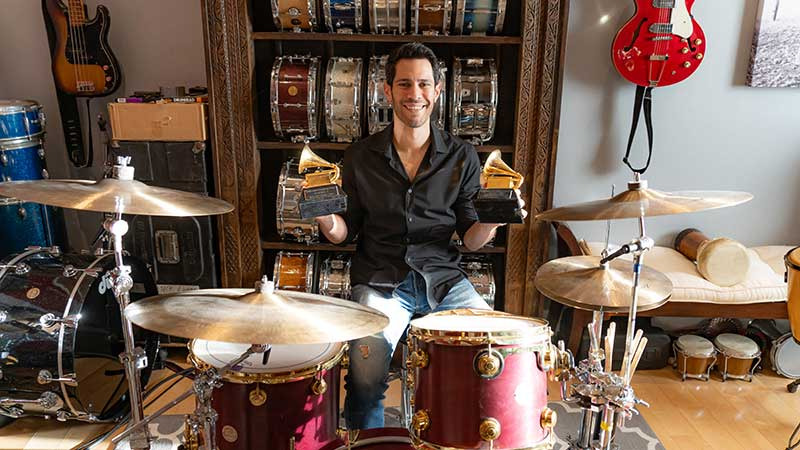
For most musicians, attaining two Grammys and having their band’s album hit platinum would signify the top milestone in one’s life. Not so for Ryan Dusick, the original drummer of Maroon 5.
“Receiving my master’s degree from Pepperdine in clinical psychology a few years ago and getting a bachelor’s from UCLA are the accomplishments that I’m most proud of… and writing my book, Harder to Breathe.”
Although Ryan was one of the founding members of the mega group Maroon 5 and lived the luminous life of a rock star, by 2004, he suffered a chronic nerve injury that brought his career to an abrupt impasse. The terrible irony of attaining the dream of superstardom success was the exact moment fate forced him to step away – thrusting Dusick onto a painful journey of self-discovery.
He recalls the moment Maroon 5 had won Best New Artist at the 47th Grammy’s in 2005 as a surreal experience.
“Everything had escalated to the highest level in terms of success just as I was crashing. We walked down toward the stage and hugged Kanye West—also nominated for Best New Artist—before going up. However, inside, I was suffering, so it was a weird juxtaposition between the highest high and the lowest low.”
Two decades after Songs About Jane (the platinum album in which Maroon 5 won several accolades in the music industry), Ryan Dusick penned a memoir Harder to Breathe/A Memoir of Making Maroon 5 and Finding Recovery. The book reveals the story behind Maroon 5’s path to celebrity, the harsh demands and struggles the band endured to succeed, Dusick’s departure from the band due to a chronic nerve injury that caused his inability to play the drums, which was followed by his battle with anxiety and addiction, and finally pursuing a career in the mental health field.

Now working as a mental health professional at The Missing Peace Center for Anxiety in Agoura Hills, CA, Ryan Dusick is an Associate Marriage and Family Therapist and a life coach, speaking publicly about mental health in the music industry.
“It’s a unique intersection for me having been in the limelight and having gone through the experience of being an artist and an entertainer, and then having expertise in education and mental health,” he claims. All those experiences combined in a way that gave him more relevance and purpose.
The evolution of Ryan’s rise as a rock star to the demise of his career – as he entered years of painful struggle with addiction – redefined his purpose in life as well as the courage to recreate his identity. Ryan’s memoir Harder to Breathe is an inspiring tale with many meanings.
“When I was a teenager, my first experience with anxiety – long before I even knew that it was called anxiety – began with a lump in my throat. I felt disconnected from my surroundings, and I remember focusing on this feeling, which made it harder for me to breathe. I’d feel lightheaded because I wasn’t breathing enough. Then I’d stop breathing for a minute and didn’t understand what was wrong. I felt I was the only person who had this problem, and it was very isolating. The title of my memoir related to that experience, but of course, the song Harder to Breathe was the hit single that we promoted for a year on the road, leading to Maroon 5’s big success.”

Interestingly, I only knew Ryan Dusick on the softball field every Sunday for seven years, as we both played a pickup game with the Beverly Hills Morning Softball group. My impression of Ryan was a soft-spoken, super-talented ball player with admirable athletic skills. Over time, I discovered he was studying psychology at Pepperdine University to become a therapist. I had often wondered what he had done professionally before that because, at the time, he was already in his 40s. Then, a few years ago, I overheard Ryan was writing a book and thought it was probably a psychology self-help book. Finally, in 2022, Ryan announced that his book had been published. I decided to google Ryan Dusick, and to my surprise, I discovered he was the original drummer of Maroon 5! On the softball field, no one ever discussed their professions. We just played ball.
As a music journalist and a Licensed Marriage Family Therapist, I was thrilled to sit down with Ryan Dusick to talk about his memoir, the history behind Maroon 5, and, most importantly, the dissolution of his identity that led to the terrifying fall into nothingness – then achieving the vulnerability and humbleness to strive once again, but this time to serve others.
Chic Compass: Ryan Dusick, Grammy-winning artist, former drummer with Maroon 5, psychotherapist, and now author of Harder to Breathe … let’s talk about the beginnings of your music career and how you met Adam Levine and the other members of Maroon 5.
Ryan Dusick: I grew up in LA in the 80s, and my family was musical. My dad’s sister, Michelle Lee, became a Broadway star, and my dad sang harmonies with her when they were kids. My mom’s family from Mexico played a lot of music. My grandfather played the mandolin and the fiddle; my uncles played guitar and jazz drums. Music was in my blood. I started playing the drums when I was 12, and my older brother Josh played the electric guitar. Classic Rock bands like Led Zeppelin, Cream, and Jimi Hendrix inspired us. I joined my brother’s first band, and at the age of 14/15, we played on the Sunset Strip at Whiskey-A-Go-Go, The Roxy, and the Troubadour.
Chic Compass: How did you meet Adam Levine?
Ryan Dusick: Adam was a family friend but was a year and a half younger than me and two grades behind me in school. (Ryan laughs) Adam was like an annoying little brother, very rambunctious and scattered; I, on the other hand, was controlled and serious. We started a band when I was 12 but never played anywhere; we never recorded a song; we just rehearsed in my parents’ garage. But that fizzled out. A few years later, when we were both at Brentwood High School, I was looking for new people to form a band. I didn’t realize Adam could sing. I knew he played rhythm guitar. Suddenly, when I was in 11th grade and he was in 9th grade, I heard him singing and realized he had a unique voice. One of the most essential qualities of a band’s success is the distinctive sound of the lead singer’s voice. It doesn’t matter how many good musicians you have playing; the voice must stand out.
Chic Compass: What was your evolution for playing the drums?
Ryan Dusick: I’d tried a couple of different instruments before choosing the drums. My brother and I took piano lessons, and I played the violin for a couple of years in the school orchestra. I was terrible at both. Funny enough, at that time, my dad had thought that the music gene would skip my generation because I wasn’t proficient at either of those instruments. However, when my brother started playing electric guitar, and it was rock’n’roll and a lot of fun … I felt free, and music was a release for my emotions. Playing the drums was a catharsis and a way of releasing angst. Entering adolescence, I had feelings I didn’t understand. I was an athlete, so I played baseball, and I was coordinated, so drums made sense to me since it was very physical.
Chic Compass: The band you originally began with Adam Levine, Jesse Carmichael, and Mickey Madden, was under the name Kara’s Flowers. You were signed by record label Reprise Records and released an album called ‘The Fourth World’ in 1997.
Ryan Dusick: In the early 90s, during the grunge era, we started what became Maroon 5. We were called Kara’s Flowers. The members were obsessed with bands like Pearl Jam, Nirvana, Sound Garden, and Alice in Chains. Those alternative rock bands of the early 90s were driven by dark, brooding, and heavy music. But over a decade, we evolved our sound and grew from teenagers to Maroon 5.
When we started the band, I was the older guy who had been in a band before and had experience, so what the sound was going to be was my idea: heavy, riffy kind of music, and Adam would sing pretty melodies on top. He and Jesse improved their songwriting skills within a couple of years. For Adam, writing lyrics took the longest as he matured as an artist.
In the 90s, you could get away with lyrics that didn’t mean much or at least sounded like they meant something. Adam was a good imitator, and he would listen to a lot of grunge music and come up with words and phrases that sounded poetic but had no real meaning beneath. He was precocious in terms of finding words and phrases that sounded good in a song, but at the same time, it took him some time to figure out what he wanted to say as a songwriter. That happened later in the Maroon 5 era of the band.

Chic Compass: How did the band evolve? I know it wasn’t an overnight success. It took ten years before the big break happened.
Ryan Dusick: We always had a special chemistry and natural talent in the band, even though we were very inexperienced in the beginning. Between ‘94, when we started the band, and ‘97, when we made our first album as Kara’s Flowers, we were signed to a record deal with Reprise at Warner Brothers. At that time, we went from grunge to pop/melodic sounds influenced by our love of The Beatles and the Mod 60s British. We were also influenced by the bands Weezer and Green Day, which had a hard-driving guitar-pop sound. There was a natural transition from the sludgy, dark, heavy stuff to a more pop sound, still guitar-driven.
The record label and everyone thought we would be big stars, but it didn’t work out that way, and we flopped. The band had to return to the drawing board and figure out if we wanted to continue. The record label then released us from our contract.
In ’98, it was a weird transitional moment, and we almost broke up. Adam and Jesse went to New York for a semester at a music school; I went back to UCLA, as did Mickey and the band’s future was on hold. As fate would have it, when Adam and Jesse came back to LA, we were all listening to the same music, and the influences now were more groove-based R&B, hip-hop, and classic soul. At the time, we thought there was no way we could incorporate a Timberland beat into our music, which seemed too audacious, so we were just toying around with more of a vintage RB kind of sound as much as any four white kids from Brentwood. I think there was enough glossiness in how we played, and Jesse was practicing and learning a lot about jazz and classical compositions.
There was a moment in one rehearsal when we said why don’t we try to emulate a hip-hop track and go for it! I started playing the beat, which was my impression of a Timberland program but on an actual drum set, and Jesse started playing a keyboard part that was funky, cool, in a hip-hop/R&B kind of way. Then we wrote a melody on top of it, and in 20-30 minutes, we had the song “Not Coming Home.”
The song had a slow-paced kind of hip-hop groove but played like a rock band with guitars and drums playing. The light bulb went on – this is different from anything we’ve ever done, and that was the beginning of creating the distinct future Maroon 5 sound.
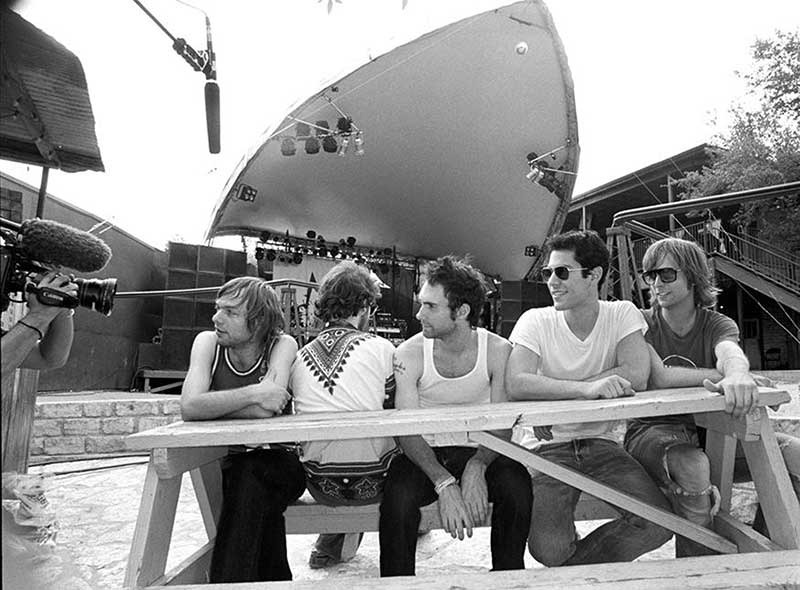
Chic Compass: What is interesting about that moment is that not only was a historic musical moment being made, but the group had to let go of any preconceived ideas of what Kara’s Flowers had been before – changing directions and not holding on tightly, which opened a magical moment, so something shifted. As psychotherapists, we also know that’s how change happens.
Ryan Dusick: Growth only happens in discomfort. As artists, you must venture out of what is safe and comfortable to break new ground.
The new ground ended up being Songs About Jane, and we brought James Valentine to play lead guitar. The band scored a new deal with Octone Records under the new name and sound, releasing Songs About Jane in 2002.
Chic Compass: Despite the huge success of this album in 2005, it took two years of a hard, grinding tour for the band.
Ryan Dusick: The album Songs About Jane came out in 2002, but we were eight years into being a band by then. From 2002 to 2003, we drove around the country and promoted our first single, “Harder to Breathe,” but it took another two years for the record to blow up!
We played over 500 shows. We did “meet and greets,” fan club shows, and in-store and radio station appearances. We were constantly traveling, and it was exhausting and exhilarating,
Then, in 2004, the single “This Love” came out, and that’s when the album blew up internationally, and we had a platinum record. However, it was ten years into us being a band when the world learned about Maroon 5 in a big way.
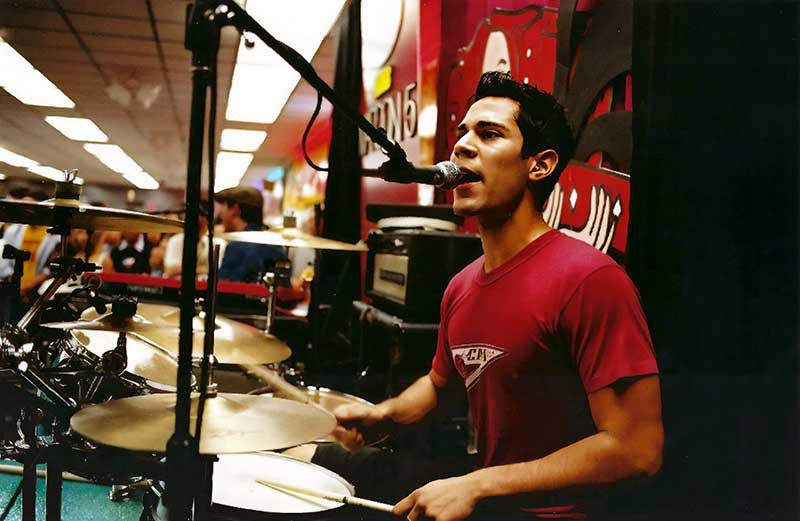
Chic Compass: From the outside, everybody thinks what a glamorous and exciting life you’re having as a rock star, but the public doesn’t realize how hard the artists are working and may be suffering too. You had been quietly dealing with painful nerve damage at this time, which affected your drumming.
Ryan Dusick: I had an old injury in my shoulder caused by pitching in high school baseball. The injury had never affected my drumming, but it became an issue around 2003. Looking back, I realize other things were going on that were mental health issues, but I didn’t have the vocabulary to talk about my mental state. I felt like there was something defective about me. I was very perfectionistic and hard on myself.
I was becoming very obsessive-compulsive about the drums themselves and about my performance. I never had stage fright, but I had a lot of adrenaline pumping through me and thoughts about making sure I did everything just right. I didn’t want to mess up when we played on live TV in front of millions of people. Having a physical problem coupled with a psychological upset weighed heavily on me. Over time, while touring overseas, jet lag became an issue, and my entire constitution started to break down. My coordination on the drums was affected, and I felt increasingly exhausted. I kept thinking we’d get a break, but the album kept building momentum, and we traveled worldwide.
I was in my mid-20s at the time. I wish that I’d had more emotional maturity and the ability to be vulnerable. My answer was to try harder, bear down, grin and bear it. I had no other option because we were in the middle of a global campaign for world domination with this album.
I was hurting and needed to take time off, but we had five guys in the band, a whole crew, a management team, a record label, agents, managers, and millions of dollars on the line. At that point, it was not an option not to play, and I knew I’d keep playing until I couldn’t play anymore.

Chic Compass: How were the other band members reacting to you then? Did they notice something was wrong?
Ryan Dusick: I wasn’t playing things as well as I used to, and I was missing a beat now and then. They would bring those things to my attention, but we were two years into touring. I would hear comments like, “You just missed the drum beat there, or “The kick drum sounds inconsistent,” and then they asked, “What’s going on?”
No one understood what was going on inside of me because I wasn’t talking about my problems. I was doing the opposite and focusing too much to get it just perfect. Finally, it got to the point where it affected my drumming, and the band told me to go home and figure out the problem no matter how long it took. I felt defeated.
I went to an orthopedist, and he told me I had chronic tendonitis in my shoulder and a lot of inflammation. I felt something bigger going on there, something more global regarding feeling defective.
Chic Compass: You began drinking more heavily at this time.
Ryan Dusick: I had a doctor who told me I needed to chill out and have a few cocktails. It was the first time in my life I used drinking to self-medicate, and at the same time, there were doctors prescribing medications, too. The combination with alcohol made things a lot worse.
I tried to come back and play the drums, but I would take three steps forward and then three steps back… that was the beginning of what became my fall into alcoholism. I’d been living the high life, the life I always dreamt of when I was aspiring to be a pop star. I had amazing experiences, not just with celebrities but also with my musical heroes—jamming with Stevie Wonder and Prince. The most difficult challenge was walking away from the brotherhood of the band. I’d been in this band for over a decade. They were my brothers. There was a camaraderie, and my entire social sphere was centered around the band. That was my identity, life’s meaning, and sense of purpose. To walk away was devasting.
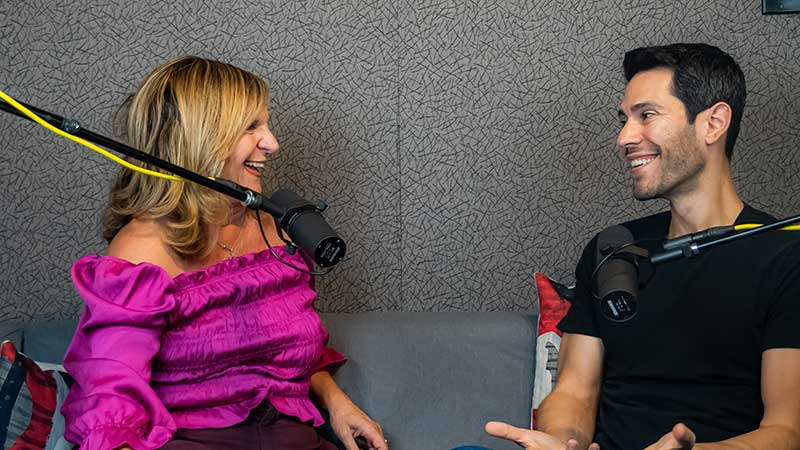
Chic Compass: This was the turning point when you dived deeper into alcoholism. You’re now back in LA, trying to fix your physical and mental stress.
Ryan Dusick: I had fallen off a cliff, and I started drinking heavily. I was very depressed, and my family and friends noticed that I was struggling. On a few occasions, family and friends told me, ‘We’re worried … we see you’re drowning.’ I didn’t want to be that guy who people were worried about. I made a very concerted effort to get myself together, which was another phase of alcoholism.
I was able to show up to family events and look like I had it together, and I was able to abstain from drinking for a time. Finally, this lifestyle was unmanageable, and I became powerless over this addiction. When I came to that realization, I had a moment of humility.
Chic Compass: You finally checked yourself into the Betty Ford rehabilitation center.
Ryan Dusick: After a couple of weeks into recovery, I realized there were guys with only a few weeks of sobriety helping others who had entered the program. Then, after a couple of weeks, I helped the new guys. I was bringing them in, and I showed them around. I told them what I’d learned, and then it hit me… I felt a purpose and meaning to my life emerge. I was now being of service to someone else. This act got me out of my self-obsession and low self-esteem, which was the result of everything I’d lost. For the first time, I had something else to offer besides being the drummer in Maroon 5.
Chic Compass: A mighty fall from grace – reaching the highest milestone in a musician’s career – then beginning again at ground zero. When people can go inside themselves and find self-worth and meaning without the external trimmings of life, resiliency and power emerge.
Ryan Dusick: It was the beginning of a long journey. In the last 7 ½ years, I have volunteered at a recovery Center, telling my story and advising people about early recovery. From there, I decided to get a master’s degree in clinical psychology and become a therapist. I’d forgotten that I was intelligent, empathetic, sensitive, and could be present with other human beings and connect with them in a meaningful way. When you’re mired in addiction, depression, and grief, it’s hard to remember anything good about yourself. I had a spiritual awakening, as cliche as that sounds …but it’s true. I’ve been seeing clients for two years now as an associate marriage and family therapist.
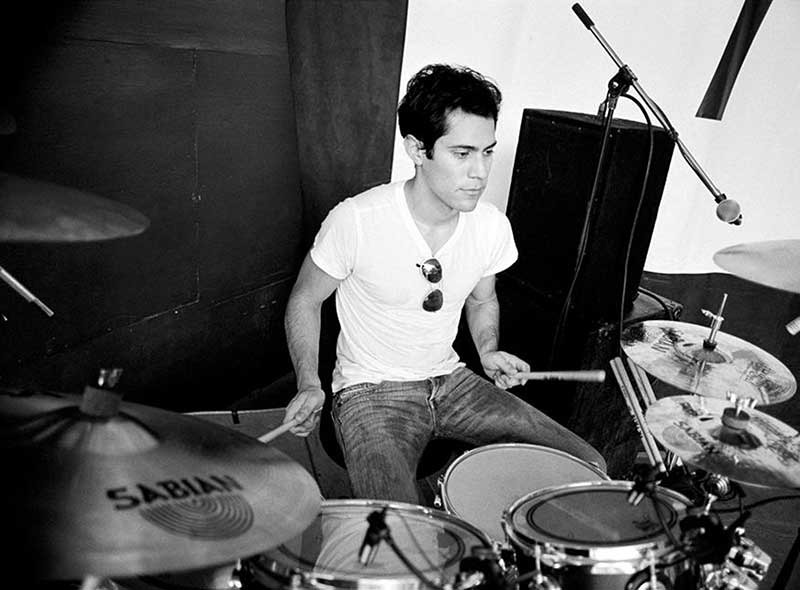
Chic Compass: What was the process of writing your Memoir, Harder to Breathe?
Ryan Dusick: I wrote the book as a result of writing self-reflection papers in graduate school. I used to love writing, but I hadn’t done it in years because anytime I tried it during my addiction years, my perfectionism got in the way. I had to finish writing and turn the papers in, which gave me more confidence and led to my writing the book.
I realized my story had a happy ending, and by telling it – a purpose emerged – to help others find hope when struggling with personal demons.
I loved the idea of rescripting the story of my life. We tell ourselves new stories about our shortcomings, how things went down because of who we are or what was wrong with us, and when we can look back on it and find lessons and meaning, that’s empowering.
Writing this book was the ultimate closure I needed, so as I went into writing the second draft, I realized it was time to go deep and be as honest and vulnerable. I was writing about the early fun stuff when the band was forming, going back to that place of being 16 years old again, driving the band around in my Jeep Wagoneer. I was sitting in that emotional place and remembering what it felt like—all the teenage absurdity—and I got to the dark, dark times. I saw a lot of connections between my teenage years and the time of my downfall. I had to sit in those moments when I was really struggling and suffering and own them. Writing then became heavy because I was reliving all the pain.
However, I realized in my new journey that I felt inspired and hopeful. If I had that experience while writing, the reader could have a similar experience.
Chic Compass: Your book has been out since November 2022. Let’s talk about its success. What’s been happening with book tours, podcast interviews, and other promotions?
Ryan Dusick: It’s been an interesting journey with the book’s release; I didn’t anticipate it. I hadn’t set out to become a speaker by trade, but I was offered opportunities to speak not just about the book but as an advocate for mental health. Doing this has become important because I now can be a voice in the conversation, advocating and destigmatizing seeking help for mental health. We need more models for male vulnerability, so speaking has become my new passion. I don’t know the next steps, whether it be a podcast or another book.

Chic Compass: You’re also speaking to the musicians about mental health.
Ryan Dusick: I didn’t set out to become a therapist or coach within the music industry. When I wrote the book, I should have anticipated it would bring me back into that world. I’ve had many people reaching out to me and suggesting that I should be working specifically with musicians or performers. I think even if I’m geared toward that demographic, all people experience stress and performance anxiety in their daily lives. I feel anyone can relate to my story, whether they’re the biggest star in the world or not. Sometime in our lives, we all find it harder to breathe.
Dr. Sanjay Gupta: Why Haven’t We Cured the Common Cold?
The average person gets two to four colds a year. With all the missed school and work, that adds up to an economic impact of…
Thought Leader: Sanjay Gupta
Erika Ayers Badan: How to Keep Creativity Alive
Hi! Ever felt like you’re on a Disney ride through every big-company headache imaginable? Think lawyers, bankers, finance goons, stale conference rooms, staid conversations and…
Thought Leader: Erika Ayers Badan
Chris Miller: Trump’s Nvidia Chip Decision Lands Hard
In a new article, “Allowing China access to advanced semiconductors puts national security and U.S. AI industry at risk,”Chris Miller — author of Chip War…
Thought Leader: Chris Miller

